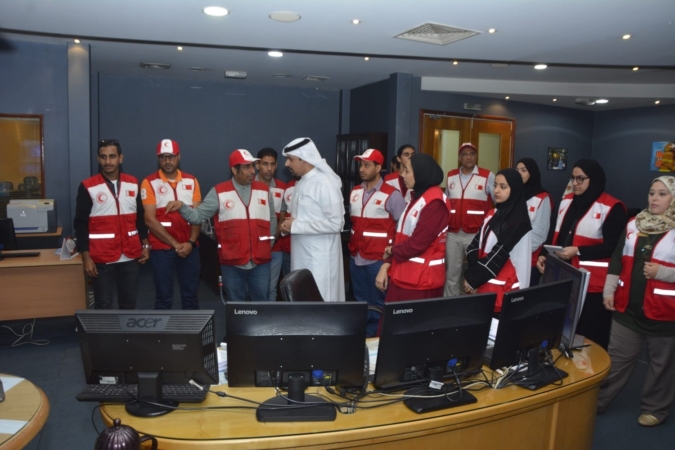The Disaster and Crisis Management Team of the Bahrain Red Crescent Society (BRCS) organized a visit to the National Center for Disaster Management at the General Administration of Civil Defense, during which they reviewed the mechanism of work in the center and how to receive and deal with reports.
The team also got acquainted during the visit on the mechanism of facing disasters in the center and limiting their effects efficiently and effectively, setting a plan for joint exercises and following up periodically on their implementation to face any disaster, and preparing all equipment and mechanisms to deal with any reports to provide assistance to citizens and residents.
The Acting Secretary-General and General Director of the Society, Mr. Mubarak Al Hadi explained that this visit comes within the framework of building the capacities of Bahraini Red Crescent volunteers, and added that the National Societies and the International Federation of Red Cross and Red Crescent Societies put the readiness to predict disasters and avoid them at the center of their work, in addition to facing those disasters and to address its effects on the international, national and local levels.
Mr. Al Hadi praised the role of the National Center for Disaster Management at the General Administration of Civil Defense in working to follow developments and coordinate efforts and stand on the preparations of the concerned authorities and provide safety instructions, in addition to the Center’s keenness to cooperate with bodies, institutes and organizations specialized in disaster and crisis management, noting this center, which is considered a paradigm shift in disaster and major accidents management based on an advanced technology system.
Confronting disasters and their effects are an essential element in development, and it also includes reducing the vulnerability of families and communities in disaster-prone regions and improving their ability to deal with the effects of disasters. It also includes strengthening the capacities of National Societies to prepare for disasters and face the post-disaster stage, and to define the role of the National Assembly and its mandate in national disaster plans, in addition to establishing regional networks of National Societies that enhance the impact of the collective cooperation work in the area of disaster preparedness and response at the international level.

